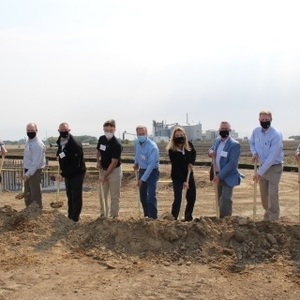REG breaks ground on wind turbine in Albert Lea, Minnesota

PHOTO: Business Wire
September 22, 2020
BY Renewable Energy Group Inc.
Renewable Energy Group Inc. broke ground on Sept. 21 on a single wind turbine that will provide power to the company’s biorefinery in Albert Lea, Minnesota. This project will provide locally sourced, clean electrical power, lowering the carbon footprint of the biodiesel plant.
Local community members, elected officials and employees celebrated the project Monday marking a first-of-its kind project for the company.
“We are committed to reducing our carbon footprint by producing cleaner burning fuels. The addition of the wind turbine will make a process that already had low carbon output even more sustainable,” said Cynthia “CJ” Warner, president and CEO of Renewable Energy Group. “We are continuously looking for innovative approaches to improve our facilities, and this project is no exception.”
Advertisement
Advertisement
The project, to be constructed and operated by Minnesota-based Juhl Energy, will save approximately 68,000 tons of carbon dioxide over the first 10 years, displacing predominantly fossil fuel-based electricity. This is the equivalent of greenhouse gas emissions from 168 million miles driven by an average passenger vehicle.
“This project is a great example of locally sourced distributed renewable energy and we’re excited that electricity produced from the wind will directly lead to lower carbon gallons of biodiesel being produced by REG,” said Clay Norrbom, managing director of Juhl Energy. “Juhl and REG have appreciated working with the many people who have made the project possible, including local landowners, city, township, and county officials, Freeborn Mower Rural Electric Coop, Dairyland Power Cooperative and Faith Technologies.”
The single wind turbine will be located north and west of the REG Albert Lea biodiesel plant. The site selection was made based on REG’s desire to limit the impact of sound and shadow flicker to the surrounding residents.
Advertisement
Advertisement
“Using wind-generated electrical energy to convert agricultural products into biodiesel is a great way to improve the plant’s environmental footprint and advance our renewable energy goals for the state,” Agriculture Commissioner Thom Petersen said. “We’re proud that Minnesota continues to be a leader in biofuels and clean energy.”
In 2019, REG produced 495 million gallons of cleaner fuel delivering over 4.2 million metric tons of carbon reduction.
Related Stories
The U.S. Energy Information Administration maintained its forecast for 2025 and 2026 biodiesel, renewable diesel and sustainable aviation fuel (SAF) production in its latest Short-Term Energy Outlook, released July 8.
XCF Global Inc. on July 10 shared its strategic plan to invest close to $1 billion in developing a network of SAF production facilities, expanding its U.S. footprint, and advancing its international growth strategy.
U.S. fuel ethanol capacity fell slightly in April, while biodiesel and renewable diesel capacity held steady, according to data released by the U.S. EIA on June 30. Feedstock consumption was down when compared to the previous month.
XCF Global Inc. on July 8 provided a production update on its flagship New Rise Reno facility, underscoring that the plant has successfully produced SAF, renewable diesel, and renewable naphtha during its initial ramp-up.
The USDA’s Risk Management Agency is implementing multiple changes to the Camelina pilot insurance program for the 2026 and succeeding crop years. The changes will expand coverage options and provide greater flexibility for producers.
Upcoming Events










